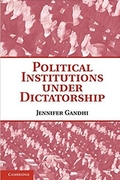
Abstract:
Often dismissed as window-dressing, nominally democratic institutions, such as legislatures and political parties, play an important role in non-democratic regimes. In a comprehensive cross-national study of all non-democratic states from 1946 to 2002 that examines the political uses of these institutions by dictators, Gandhi finds that legislative and partisan institutions are an important component in the operation and survival of authoritarian regimes. She examines how and why these institutions are useful to dictatorships in maintaining power, analyzing the way dictators utilize institutions as a forum in which to organize political concessions to potential opposition in an effort to neutralize threats to their power and to solicit cooperation from groups outside of the ruling elite. The use of legislatures and parties to co-opt opposition results in significant institutional effects on policies and outcomes under dictatorship.
This publication is available at the folllowing site: